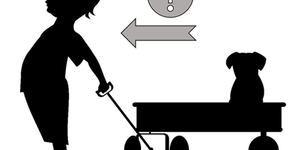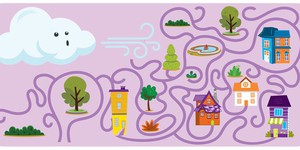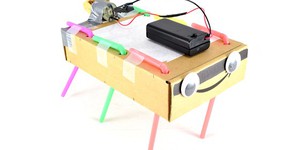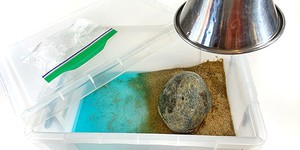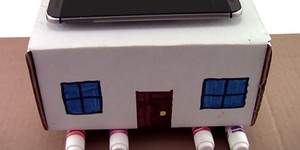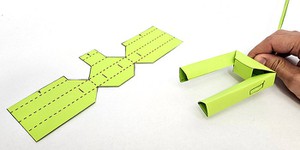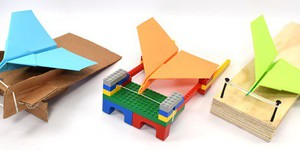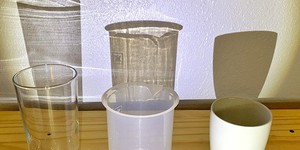Lesson Plans (247 results)
|
Select a resource
Sort by
|
Lesson Plan
Grade: Kindergarten
23 reviews
At some point, many children wish for a pet animal to play with and care for. But what does it take to keep an animal alive and healthy? In this engaging lesson plan, children will act out adopting a pet and shopping for items based on its needs. As they bring their items together, they will notice that every animal needs food, water, shelter, and air to survive.
Read more
NGSS Performance Expectations:
Lesson Plan
Grade: Kindergarten
10 reviews
Your kindergarten students are used to moving objects. They throw balls, play with toy cars, and sweep the floor, but how much do they think about these actions? In this fun, hands-on lesson, you will use a game (rolling balls) to explore how pushing and pulling affects an object's motion.
This lesson can be expanded with a second lesson exploring how objects can push each other, and how weight influences motion.
Read more
NGSS Performance Expectations:
Featured
Lesson Plan
Grade: 4th-12th
2 reviews
Students will explore the elements by designing a wind maze, a device that can direct the wind along a specific path.
Learning Objectives
Students will:
Design and test a wind maze.
Consider how to direct the wind down an intended path by creating bends in the maze.
Use observations from their tests to compare solutions and iterate on their designs.
NGSS Alignment
This lesson helps students prepare for these Next Generation Science Standards Performance Expectations:
…
Read more
Lesson Plan
Grade: 6th-8th
7 reviews
Junkbots are easy-to-build robots that you can make using a simple circuit and some recyclable materials. In this lesson, your students will learn about engineering design as they compete to build the fastest robot. No previous robotics experience is required!
Read more
NGSS Performance Expectations:
Lesson Plan
Grade: 6th-12th
Create a two-part system for filtering greywater. Teams will focus on communication and systems engineering as they build separate components to filter solid and liquid waste and then combine them into one device.
Learning Objectives
Students will:
Consider the potential effects of drought and how greywater could be part of the solution.
Design a system for filtering out solid waste or liquid waste.
Consider effective communication strategies with their team.
Collaborate on their design…
Read more
Lesson Plan
Grade: 6th-8th
6 reviews
Earth is a planet full of water. 70% of its surface is covered with water in oceans, lakes, rivers, and more. Water on our planet can also be found in the atmosphere and underground. In this lesson, students will explore how water is continually cycled among land, the oceans, and the atmosphere. As students build a physical model of the water cycle, they will be able to simulate and observe evaporation, condensation, precipitation, and other water cycle processes in real-time.
Remote…
Read more
NGSS Performance Expectations:
Featured
Lesson Plan
Grade: 8th-12th
1 review
In this lesson, students will do a series of activities to explore the role of antibodies in our immune system. They will also investigate how doctors use monoclonal antibodies as part of immunotherapy to treat diseases like cancer.
Read more
Lesson Plan
Grade: 6th-8th
6 reviews
Explore how technology can save lives in this fun engineering lesson plan! Earthquakes can cause devastation and loss of life when they strike, but earthquake-resistant buildings can stay standing and keep people safe. In this project, your students will build model earthquake-resistant buildings and measure their movement during a simulated earthquake using a mobile phone and a sensor app.
A French translation of this activity is available.
Read more
NGSS Performance Expectations:
Lesson Plan
Grade: 6th-12th
1 review
When your students think of robots, they probably think of materials like metal or plastic—but what about paper? In this lesson plan, your students will learn to make robotic parts from readily available classroom materials. Optionally, they can apply the engineering design process to improve the design or come up with their own designs.
Read more
Lesson Plan
Grade: 6th-8th
7 reviews
Aircraft carriers are much shorter than a typical airport runway. How do airplanes manage to gain enough speed for takeoff over such a short distance? A catapult gives them an extra boost! In this lesson, your students will practice engineering design as they build their own paper airplane launchers, while learning about kinetic and potential energy.
Read more
NGSS Performance Expectations:
Lesson Plan
Grade: 6th-8th
2 reviews
Global warming, pollution, and deforestation are just a few examples of how human actions affect our planet. How can we reduce our impact on the environment? In this lesson, students will find out by using an online tool called
Your Plan, Your Planet.
Based on their findings, students will come up with their own action plans aimed at reducing their personal ecological footprint and assess its effectiveness after implementation.
Read more
NGSS Performance Expectations:
Lesson Plan
Grade: 1st
12 reviews
In this lesson, students explore firsthand what transparent, translucent, and opaque mean, and how they are related to light. They will place a variety of materials in front of an illuminated object and predict if and how well they will be able to see the object through the material sheet. In doing that, students will realize that different materials allow different amounts of light to pass through.
Remote learning:
This lesson plan can be conducted remotely. The Engage section of the…
Read more
NGSS Performance Expectations:
|
Explore Our Science Videos
Turn Milk into Plastic! Lesson Plan Introduction
Build a Solar-Powered Car for the Junior Solar Sprint
Video: Winding Coil




